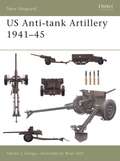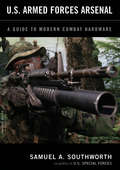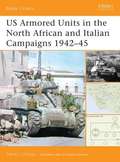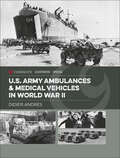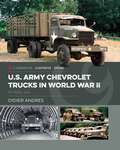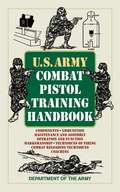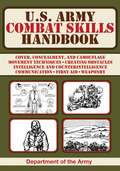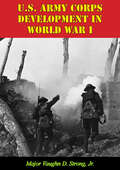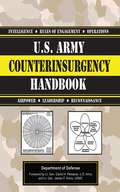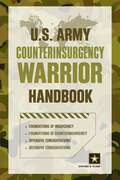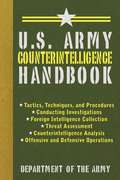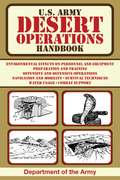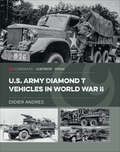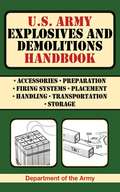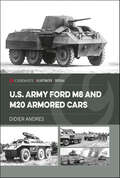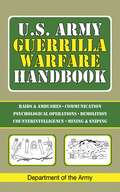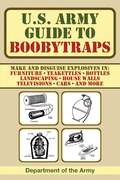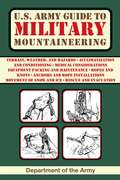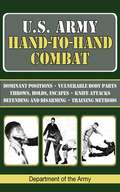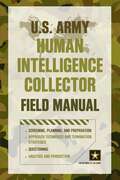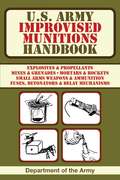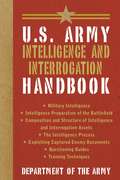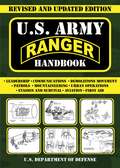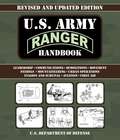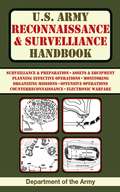- Table View
- List View
U.S. Anti-tank Artillery, 1941-45
by Steven J. ZalogaThe 37mm anti-tank gun developed by the U.S. army becoming obsolete, the U.S. began the licensed manufacture of the British 6-pdr. Further anti-tank measures and weapons designed specifically for use by the Tank Destroyer Force were developed.
U.S. Armed Forces Arsenal: A Guide to Modern Combat Hardware
by Samuel A. SouthworthA handy guide to the fearsome hi-tech weapons and modern equipment of today's American forces
U.S. Armored Units in the North African and Italian Campaigns, 1942-45
by Steven J. ZalogaDetails the evolution of U.S. armoured warfare tactics and doctrine, learned from the difficult experiences of North Africa, and illustrates how they were used elsewhere in the MTO, particularly in the Italian Peninsula.
U.S. Army Ambulances & Medical Vehicles in World War II (Casemate Illustrated Special)
by Didier AndresA “cool compendium” of photos and information about the vehicles that helped save American troops’ lives (Cybermodeler).Of all the armies involved in World War II, the U.S. Army developed the most sophisticated system for the transport and treatment of injured and sick soldiers, pushing the boundaries of available technology to give their men the best chance of not only survival but a full recovery.Each infantry regiment had a medical detachment tasked with conserving the strength of the regiment by not only providing medical and dental treatment but also undertaking all possible measures to keep the regiment healthy. In combat they would provide emergency medical treatment on the battlefield, then move casualties to aid stations they had established. At aid stations, casualties would be triaged, stabilized, and treated before being moved on for further treatment. Vehicles formed a crucial part of the Medical Detachment’s equipment.This fully illustrated, comprehensive book covers all types of medical vehicles used both in-theater and in the United States, including ambulances and technical support vehicles. It details vehicle markings modifications, for use in the evacuation of troops from the battlefield, and the other uses these vehicles were adapted for during the war—including their use as “Clubmobiles” and “Chuck Wagons” by the American Red Cross.
U.S. Army Chevrolet Trucks in World War II (Casemate Illustrated Special)
by Didier AndresA detailed, pictorial history of the 1 1/2-ton Chevy truck and its use by the U.S. Army during World War II.From 1940 to 1945, large numbers of trucks of all categories were delivered to the U.S. Army by the Chevrolet Motor Division of General Motors. Over 160,000 of these trucks were G-506 light four-wheel-drive trucks—which became the standard 1 1/2-ton, 4x4 truck for both the U.S. Army and Army Air Corps during the war. In addition, many more thousands were delivered to Allied forces as part of the Lend-Lease program, including nearly 50,000 delivered to the Soviet Union. Tough, well-built, and more agile than the deuce and a half, the Chevy 1½ ton played a part in every theater of operations during the war. Its durability and mechanical reliability made it ideal for a wide range of missions. Not for nothing did Chevy advertise the trucks during the war as “Vehicles of Victory.”More than 75 years after it was designed, the small Chevrolet truck is still a favorite with collectors. This fully illustrated book details the different series of trucks and their many uses within the U.S. Army including cargo trucks, panel delivery trucks for the Signal Corps, dump trucks for engineers, telephone trucks, tractors, and bomb service trucks for the air force. It also covers their part in the Lend-Lease program, and their continued use after the war.
U.S. Army Combat Pistol Training Handbook (US Army Survival)
by ArmyThis handbook is perfect for those interested in joining the army as well as for those who merely want to learn how to shoot combat pistols. The U.S. Army Combat Pistol Training Handbook (FM 3-23.35) reflects current Army standards in weapons qualification and can be a guide for the instructor to develop training programs, plans, and lessons that meet the objectives of the U.S. Army Marksmanship program for developing combat effective marksmen.The first part focuses on the components and functions of the pistols, where readers will learn about components, ammunition, maintenance and assembly, clearing procedures, preventive maintenance, operation, loading, unloading and clearing, troubleshooting, and much more. The second part is where things get fun and where readers will find instructions on topics such as basic marksmanship, grip and aiming, breath control, trigger squeeze, techniques of firing, target engagement, combat reloading techniques, coaching, and safety, among others. Finally, the appendixes include a thorough explanation of the U.S. Army qualification courses and training schedules.This compact guide will tell you everything you need to know about training with an M9 or M11 pistol. Loaded with illustrations and charts, this handbook shows as well as tells how to be the best pistol shooter in the Army.
U.S. Army Combat Skills Handbook (US Army Survival)
by ArmyRecognizing that “wars are not won by machines and weapons but by the soldiers who use them,” this comprehensive manual not only informs the reader of the timeless skills necessary to survive on the battlefield, but also instructs the soldier on how to perform and execute these tasks to succeed in combat. From concealment and mobility to first aid and personal care, you too can possess the knowledge armed service people are equipped with so they can do their jobs properly and confidently. This informative and exhaustive guide draws upon the real-life experiences of soldiers who have faced warfare and lived in combat zones. Practical and explicit instructions on team formation, proper positioning for offensive and defensive maneuvers, and handling of equipment and weaponry are thoroughly explained. Also included is advice on life-saving CPR and wound-care techniques; sections on combat intelligence and nuclear, biological, and chemical warfare; and appendices covering mines, demolitions, obstacles, combat in urban areas, tracking, and evasion and escape. Illustrations throughout the book depict various field scenarios that soldiers face in a war zone. See what it takes to perform, inspire, and lead in the U.S. Army!
U.S. Army Corps Development In World War I
by Major Vaughn D. Strong Jr.This paper examines the development of the American Army corps structure during World War I. The corps formation developed in World War I by General John J. Pershing was the culmination of 56 years of lessons learned from the Civil War through the beginning of World War I. The success of the American Expeditionary force (AEF) in World War I was, in large part, the result of the development and combat effectiveness of the corps formation. The corps formation allowed commanders flexibility, concentrated firepower, sustainability, and increased command and control.The American corps formation in World War I led the AEF to victory in the Saint Mihiel and Meuse-Argonne campaigns. The American corps formation provided resources and capabilities that helped provide the needed edge to defeat the Central Powers and help end World War I.
U.S. Army Counterinsurgency Handbook (US Army Survival)
by David H. Petraeus James F. Amos ArmyAnyone with an interest in what our troops are doing overseas will find this government manual an excellent source of information. It gives a detailed breakdown of what an insurgency is, how one starts and builds, and what our forces must do to overcome it. Find out the key roles often taken by insurgents; how to carry out intelligence, surveillance, and reconnaissance missions; and what ethical questions arise in handling these types of situations. Historical examples and anecdotes of both successes and failures provide an overall perspective. Dozens of illustrations and charts break down the information for civilians, and appendices cover legal issues, translation difficulties, airpower, and more.
U.S. Army Counterinsurgency Warrior Handbook
by Department of the ArmyIn the global War on Terror, among the greatest threats to the United States military are insurgent uprisings. Enter the U.S. Army Counterinsurgency Warrior Handbook, the counterinsurgency playbook used by the greatest army in the world. This manual establishes fundamental principles for tactical counterinsurgency operations at the company, battalion, and brigade level. It is based on lessons learned from historic counterinsurgencies and current operations. The realities of today&’s operational environment—an environment modified by a population explosion, urbanization, globalization, technology, the spread of religious fundamentalism, resource demand, climate change and natural disasters, and proliferation of weapons of mass destruction. Both a boots-on-the-ground field guide to defeating an insurgency in a nation where the U.S. military has oversight and a high-level leadership guide for commanders organizing counterinsurgency efforts, this book—which includes battle diagrams and illustrations—is not only a must-read for military buffs, but also a valuable resource for business and gaming strategists.
U.S. Army Counterintelligence Handbook (Us Army Survival Ser.)
by Department of the ArmyThe life of a counterintelligence (CI) operative has been immortalized in film and novels as being filled with glamour and excitement. While international travel, heroism, and danger are all part of the job description, the fundamentals of counterintelligence are discipline, skill, and—well—intelligence. CI operations include conducting investigations, offensive and defensive operations, security and vulnerability analyses, and intelligence collection in peace and at all levels of conflict to support command needs. This guide serves to inform commanders, agents, and analysts on how to identify, neutralize, and exploit any foreign attempts to conduct operations against the U.S. Army. Find out how CI operatives combat terrorism, create battlefield deception, and inform all echelons of combat of both real and potential threats from the U.S. Army's own guide to counterintelligence. The tactics, techniques, and procedures (TTP) outlined are the same instructions that CI personnel follow in the field. As the world becomes more interconnected and as technological advances continue to be made, proper CI techniques are exceedingly critical to the protection of the U.S. Army. Counterintelligence is not just the subject for an entertaining story, it is how peacekeeping, humanitarian, and counter-drug operations are carried out in this globalized world.
U.S. Army Desert Operations Handbook (US Army Survival)
by ArmyImagine working all day in 100-degree plus temperatures under constant life-threatening circumstances, sometimes relying only on the negligible amount of hydration from a cactus you’ve dug up. This is the life of a U.S. Army soldier in places like Iraq, Afghanistan, and elsewhere, which is why the U.S. Army Desert Operations Handbook is a vital reference for survival in one of the harshest environments in the world. This official guide covers how to plan and conduct operations, how the environment affects personnel and equipment, and most importantly, how to survive and receive supplies in the desert. The obvious problems with extreme temperatures are water location and mobility. However, from handling and caring for firearms to operating and fueling a tank, the entire game changes in the dry, sandy desert conditions. The skills in this guide are taken from lessons learned in real combat situations. Success in desert operations requires the ability to adapt with constant terrain and temperature changes, which are often drastic within the same twenty-four–hour period. All the while, the soldier must be able to move within a unit without being visible to unfriendly groups. This combat-tested manual is sure to arm anyone with the skills necessary to survive in the desert.
U.S. Army Diamond T Vehicles in World War II (Casemate Illustrated Special #Ciss0012)
by Didier AndresA detailed summary of all types of Diamond T vehicles used by the U.S. Army during World War II, packed full of period photos and diagrams.Between 1940 and 1945, Diamond T Motor Car Company supplied just over 50,000 vehicles to the U.S. military, and also to the Allies. Of this, just over 30,000 were heavy 4-ton 6x6 trucks of varying types: cargo, tow truck, pontoon carrier, engineer, cartographic, etc. The “Diamond” would serve in all theaters of operations, wherever its robustness and reliability were necessary to complete the mission. Due to its expertise, Diamond T also produced the famous half-track, with more than 10,000 manufactured. All these models are described in this work by Didier Andres, an expert in the subject. The text is illustrated throughout using archival and period photographs and diagrams.Praise for U.S. Army Diamond T Vehicles in World War II“Another excellent collaboration of the Casemate Illustrated Specials with the author Didier Andres and a great tribute to this legendary vehicle. A worthy addition to any personal library whether it belongs to an historian, a vehicle restorer, or a builder of military miniatures. This volume is highly recommended without reservation.” —War Wheels“This comprehensive and fully illustrated account describes in technical detail the evolution of the Diamond T design and all the Diamond T models produced for the Army during World War II . . . Highly recommended for beginner to advanced builders.” —AMPS
U.S. Army Explosives and Demolitions Handbook (US Army Survival)
by ArmyMilitary demolitions are the destruction by fire, water, explosive, and mechanical means of areas, structures, facilities, or materials to accomplish a military objective. The U.S. Army Explosives and Demolitions Handbook is a guide to the use of explosives in the destruction of military obstacles from the Department of the U.S. Army. This guide includes information on types, characteristics, and uses of explosives and auxiliary equipment; preparation, placement, and firing of charges; safety precautions; handling, transportation, and storage of explosives; deliberate and hasty demolition methods; and much more. Applicable to nuclear and nonnuclear warfare, and having offensive and defensive uses, the knowledge one will come away with from reading this handbook is invaluable.
U.S. Army Ford M8 and M20 Armored Cars
by Didier AndresFinalist, 2023 Army Historical Foundation Distinguished Writing Awards The M8 and M20 served in Europe and the Pacific during WWII. Author has used the archived notes of the officer tasked with coordinating the project to develop and deliver the M8, explaining why it took two years to deliver it to the Army. Over 200 photographs make this a great reference for any military modeler or vehicle enthusiast.
U.S. Army Guerrilla Warfare Handbook
by ArmyThey can be swift, silent, and deadly. That's why armed guerrillas are feared by even the largest, best-equipped fighting forces. No tank, rocket-propelled grenade, or infantry battalion can match the guerrilla team's ability to exact brutality with precision, instill fear in enemy hearts, and viciously deflate morale. From the snows of Korea to the jungles of Southeast Asia to the mountains of Afghanistan, the U.S. Army has employed guerrilla tactics to deadly effect. Those tactics and techniques, being used today by U.S. soldiers, are laid out in the U.S. Army Guerrilla Warfare Handbook. Employing small, heavily-armed, and well-oiled fire teams, guerrilla warfare has played an invaluable role in the success of nearly every U.S. campaign for decades. Here, its methods are detailed: raids and ambushes, demolition, counterintelligence, mining and sniping, psychological warfare, communications, and much more. This is an inside look at the guerrilla strategies and weapons that have come to be feared by enemies and respected by allies. Not another outside perspective or commentary on unconventional warfare, this is the original--of use to soldiers in the field and to anyone with an interest in military tactics.
U.S. Army Guide to Boobytraps: Make And Disguise Explosives In - Furniture - Teakettles - Bottles - Landscaping - House Walls - Televisions - Cars - And More
by ArmyLittle is more dangerous to U.S. forces fighting insurgents in hot spots around the world than improvised explosive devices. It’s the weapon of choice for under-funded forces aimed to attack American soldiers with low risk to themselves. This official U.S. manual is the complete guide to using and dismantling boobytraps. Here you can learn how to assemble, use, detect, and remove boobytraps and demolition items in almost any situation. With intricate and detailed diagrams, you’ll discover how army troops can disguise boobytraps in household items such as irons, teapots, and televisions; in structures such as window frames, stairways, and wooden beams; and in outdoor areas, in bushes and underground. Find out how boobytraps work, why they are used in the army, and the tactics behind their set-up. Learn the mechanics of the various types of firing devices, detonators, fuses, cords, adapters, blasting caps, and lighters. Also included are detailed instructions for detecting and removing boobytraps. The U.S. Army Guide to Boobytraps explains the responsibilities and safety issues that should be thoroughly understood by anyone using any weapon. Any military enthusiast will appreciate the level of detail this field manual offers.
U.S. Army Guide to Military Mountaineering (US Army Survival)
by ArmyMountains exist in almost every country in the world and almost every war has included some type of mountain operations. This pattern will not change, and soldiers will continue to fight in mountainous terrain in future conflicts. Although mountain operations have not changed, several advancements in equipment and transportation have increased the soldiers' capabilities. The helicopter now allows access to terrain that was once unreachable or could be reached only by slow methodical climbing. Inclement weather, however, may place various restrictions on the capabilities of air assets available to a commander. The unit must then possess the necessary mountaineering skills to overcome adverse terrain to reach an objective.The U.S. Army Guide to Military Mountaineering details techniques soldiers and leaders must know to cope with mountainous terrain. These techniques are the foundation upon which the mountaineer must build. They must be applied to the various situations encountered to include river crossings, glaciers, snow-covered mountains, ice climbing, rock climbing, and urban vertical environments. The degree to which this training is applied must be varied to conform to known enemy doctrine, tactics, and actions. This guide also discusses basic and advanced techniques to include acclimatization, illness and injury, equipment, anchors, evacuation, movement on glaciers, and training.
U.S. Army Hand-to-Hand Combat: Training - Ground-fighting - Takedowns And Throws - Strikes - Handheld Weapons - Standing Defense - Group Tactics (US Army Survival)
by ArmyIn close-quarter combat, there is no second chance and no room for error. On the street, as in military combat, even the smallest mistake can make the difference between life and death. U.S. Army Hand-to-Hand Combat is the official field manual (FM 21-150) used by U.S. Army soldiers-men and women trusted, trained, and tasked to protect the United States from enemies in every kind of situation. From a rundown of training methods to essential information about throws, holds, escapes, knife attacks and more, it covers every tactic and scenario clearly and thoroughly. When weapons are unavailable or not advisable, the techniques in this manual will show every reader the skills necessary to neutralize an attacker swiftly and effectively.
U.S. Army Human Intelligence Collector Field Manual
by Department of the ArmyAmong the most crucial roles of the United States military in the global War on Terror is the collection of human intelligence from prisoners of war, unlawful combatants, and others. On the heels of controversy over some of the techniques used to extract information—such as waterboarding—the Department of the Army completely revised its interrogation guidelines. The result is this book, the United States Army&’s human intelligence collection playbook, which gives instructions on the structure, planning and management of human intelligence operations, the debriefing of soldiers, and the analysis of known relationships and map data. The largest and most newsworthy section of the book details procedures for screening and interrogation, which permits a specific number of interrogation techniques, described in Chapter 8 as &“approach techniques.&” These techniques, described in great detail, carry such names as Emotional Love,Mutt and Jeff, False Flag, and even Separation. A must-read for today&’s military buffs, U.S. Army Human Intelligence Collector Field Manual is also a valuable resource for anyone seeking strategies to employ in the gathering of information.
U.S. Army Improvised Munitions Handbook: Explosives & Propellants, Mines & Grenades, Mortars & Rockets, Small Arms Weapons & Ammunition Fuses, Detonators, & Delay Mechanisms (US Army Survival)
by ArmyYou don’t need to be a trained soldier to fully appreciate this edition of the U.S. Army Improvised Munitions Handbook (TM 31-210). Originally created for soldiers in guerilla warfare situations, this handbook demonstrates the techniques for constructing weapons that are highly effective in the most harrowing of circumstances. Straightforward and incredibly user-friendly, it provides insightful information and step-by-step instructions on how to assemble weapons and explosives from common and readily available materials. Over 600 illustrations complement elaborate explanations of how to improvise any number of munitions from easily accessible resources. Whether you’re a highly trained solider or simply a civilian looking to be prepared, the U.S. Army Improvised Munitions Handbook is an invaluable addition to your library.
U.S. Army Intelligence and Interrogation Handbook: The Official Guide On Prisoner Interrogation (US Army Survival)
by ArmyThe U.S. Army Intelligence and Interrogation Handbook provides doctrinal guidance, techniques, and procedures governing the use of interrogators as human intelligence collection agents in support of a commander's intelligence needs. It outlines the interrogator's role within the greater intelligence effort as well as the unit's day-to-day operations, and includes details on how interrogators accomplish their assigned missions. This handbook is intended for use by interrogators as well as commanders, staff officers, and military intelligence personnel charged with conducting interrogations, and applies to operations at all levels of conflict intensity, including conditions involving the use of electronic warfare or nuclear, biological, or chemical weapons.The U.S. Army Intelligence and Interrogation Handbook builds upon existing doctrine and moves interrogation into the twenty-first century within the constraints of the Uniform Code of Military Justice and the Geneva Conventions. Principles, guidelines, and topics covered include:The definition of interrogationInterrogator capabilities and limitationsWarfighting doctrineThe intelligence cycle, and its disciplines and operationsAmphibious and airborne operationsThe interrogation processExploiting captured enemy documentsA tactical questioning guideAnd many more tactics and techniques used by the U.S. Army!
U.S. Army Ranger Handbook (Us Army Survival Ser.)
by ArmyThis handbook offers the techniques and tactics that make Army Rangers the best soldiers in the world. These highly-trained, easily-deployable, and widely-skilled infantrymen specialize in airborne assault, raids, recovery of personnel and equipment, and airfield seizure, among other difficult and dangerous missions. Drawing from over two centuries of bloody lessons learned in special operations combat, this guide gives modern soldiers the best advice possible. In straightforward language and a no-frills style, it covers deception, stealth, communications, escape and evasion, ambush operations, perimeter defense, counterintelligence, and much more. Handy and concise, this manual was designed so Rangers could easily carry it into the field. Now it is the ultimate resource for anyone who wants to know how Rangers think and work.
U.S. Army Ranger Handbook: Revised and Updated (Us Army Survival Ser.)
by U.S. Department of DefenseFrom the US Department of Defense, the Skills, Tactics, and Traits of the Most Highly Skilled Soldiers in the World—Army Rangers. This handbook offers the techniques and tactics that make U.S. Army Rangers the best soldiers in the world. These highly trained, easily deployable, and widely skilled infantrymen specialize in airborne assault, raids, recovery of personnel and equipment, and airfield seizure, among other difficult and dangerous missions. Now, in this recently revised edition of the U.S. Army Ranger Handbook, you can get the latest info on everything from understanding the basics of Army operations and tactics to discovering what makes a soldier with good leadership qualities and character. Although primarily written for Rangers and other light infantry units, it serves as a handy reference for all military units, covering how infantry squad- and platoon-sized elements conduct combat operations in varied terrains. Drawing from over two centuries of lessons learned in special operations combat, this guide provides modern soldiers with best training possible. It effectively combines the lessons of the past with important insights for the future to help make army leaders the absolute best they can be. In straightforward, no-frills language, it covers deception, stealth, communications, escape and evasion, ambush operations, perimeter defense, counterintelligence, and much more. This book is the ultimate resource for anyone who wants to know how Rangers think and function.
U.S. Army Reconnaissance and Surveillance Handbook (US Army Survival)
by ArmyThroughout history, military leaders have recognized the importance of reconnaissance and surveillance. Gaining and maintaining contact with the enemy is essential to win the battle, and U.S. military history contains many examples where our knowledge of the enemy, or lack of knowledge, directly led to victory or defeat. The role of reconnaissance and surveillance has not diminished on the modern battlefield; if anything, it has become even more important. Battles at the combat training centers prove that a good reconnaissance and surveillance effort is critical to successful attacks. On the other hand, a poor reconnaissance and surveillance effort almost guarantees defeat for the commander. The message is clear: success on the battlefield begins with reconnaissance and surveillance.Direct from the United States Army, U.S. Army Reconnaissance and Surveillance Handbook provides tactics, techniques, and procedures for reconnaissance and surveillance planning, mission management, and reporting. It also covers the development of intelligence to support counter-reconnaissance operations, employment considerations for reconnaissance, and surveillance assets, and defines the roles of various personnel in planning operations. Intended for maneuver commanders and their staffs; intelligence staffs and collection managers; and other personnel involved in planning and reconnaissance and counter-reconnaissance operations, and now available to everyone, U.S. Army Reconnaissance and Surveillance Handbook provides an insider's look into the world of Army intelligence.
